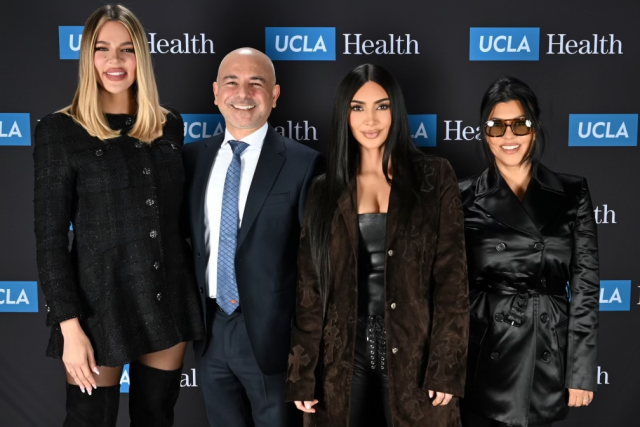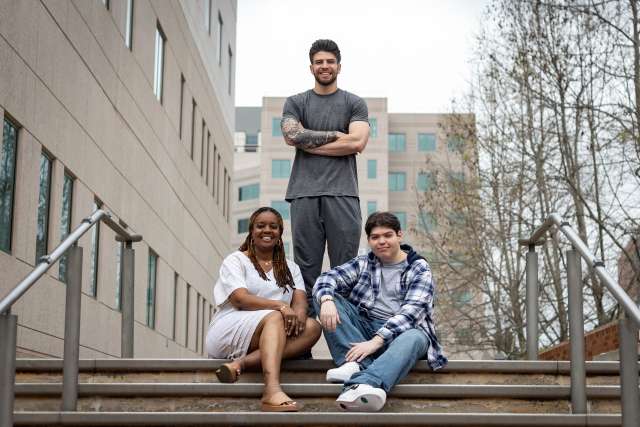For many college students, the summer break means basking at the beach, traveling to exotic locales or just hanging out with friends. But this summer meant something quite different to a dedicated group of college students from disadvantaged backgrounds. Thanks to a free program offered by the David Geffen School of Medicine at UCLA, these students took part in a six-week summer program to further their dreams of becoming health care professionals.
“I was ecstatic about this opportunity and couldn’t wait to get involved,” said Nahun Flores, a 29-year-old who attends Chaffey College in Rancho Cucamonga, about 60 miles east of UCLA. Flores was one of 80 participants from underrepresented minorities and underprivileged backgrounds who have an interest in medicine, dentistry, nursing and other health professions who took advantage of the Summer Health Professions Education Program, known as SHPEP, for college sophomores, juniors and community college students.
A native of Nicaragua, Flores said he is grateful for the opportunity to participate in the program, which was administered at the Geffen School of Medicine and 12 other U.S. sites, thanks to a generous grant from the Robert Wood Johnson Foundation.
“When we migrated to the U.S.,” Flores said, “we had access to health care; however we encountered many challenges because of health disparities. Facing those challenges and going through those experiences has impacted my character and made me realize that I need to become a doctor so I can help out and make a difference in our community. I am a U.S. citizen now and I feel the need to give back. These people, my community, are my motivation and the burning fire in my heart that gets me going every day to pursue a career in medicine.”
Dr. Clarence Braddock, vice dean of education for the medical school and principal investigator for SHPEP, says the UCLA summer program also focuses on students “who are the first family member to go to college, who don’t have family role models or mentors, or who are otherwise socio-economically disadvantaged.”
The program exposes students to real-world health problems, lectures, patient experiences, small-group discussions and they must also complete a research project. Students also take classes in the basic sciences and math needed for health care professionals, as well as financial planning workshops. They learn study skills and receive coaching on how to interview, fill out applications and touch on important life skills. Upon completion of the program, the participants better understand the urgent need for health care professionals in medically underserved communities and of the educational pathways that lead to providing medical, dental, and nursing services to underserved populations.
“At the David Geffen School of Medicine at UCLA, we aspire to be a positive force for improving diversity in our profession,” Braddock said. “We seek to cultivate the brightest pool of applicants to our medical school to be more representative of minorities and people from disadvantaged backgrounds. This is one of the many ways we try to produce a more diverse physician workforce that meets the needs of our communities.”
“Many of the participants have seen family members struggle to get access to quality care, either because of cultural, socioeconomic or language barriers,” Braddock said. “Exploring these issues often makes them want to be part of the solution.”
Flores noted that the lack of health care he and his family experiences since he was a child is the reason he wants to become a physician. His goal is to open health centers in San Bernardino and Los Angeles counties for those who are unable to get medical attention due to health disparity reasons.
As Flores was nearing completion of the program, he said he was encouraged by the diversity of the medical school’s leaders and how they served as role models.
“What makes it special is that they have been in our shoes and are now doing great things including being involved with the program,” he said. “This is extremely inspiring for me as it exudes hope that the dream can come true for anyone coming from disadvantaged backgrounds. It simply sends the statement that the future is in our hands. Your hard work will pay off.”
One of those role models for the students is Braddock.
“Students have told me how empowering it was to hear that I grew up in a community not too different from where they’re growing up and went to a big public high school like they did, and that I struggled with my own self-doubt along the way,” Braddock said. “And yet I've become a physician and vice dean at a top medical school, so maybe they can too.”



